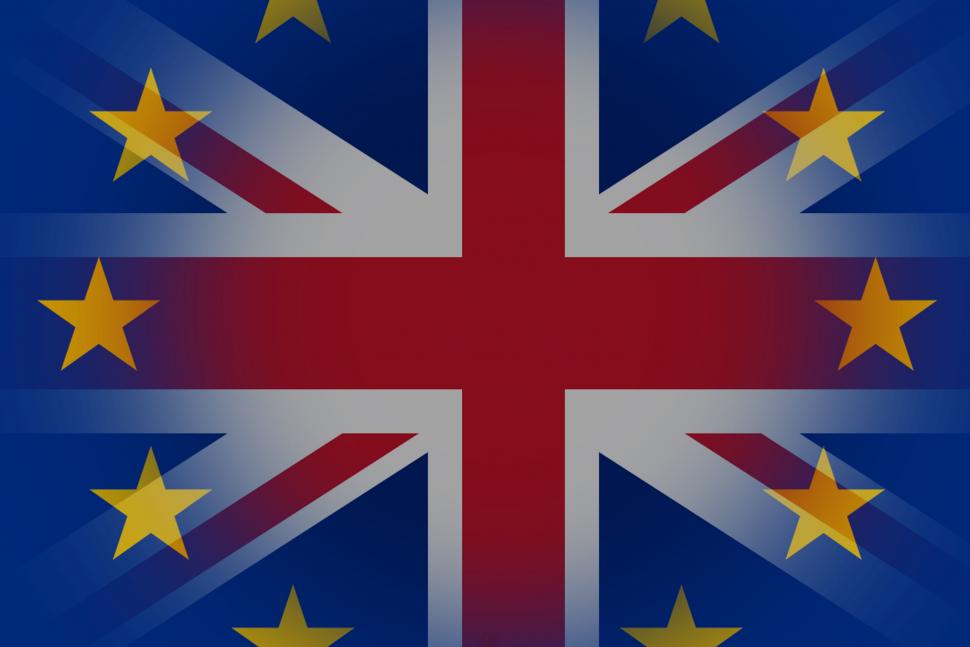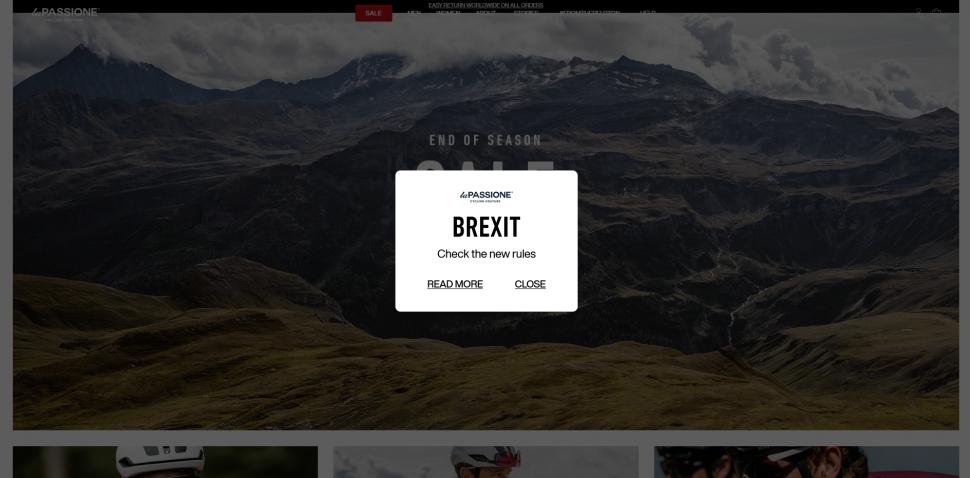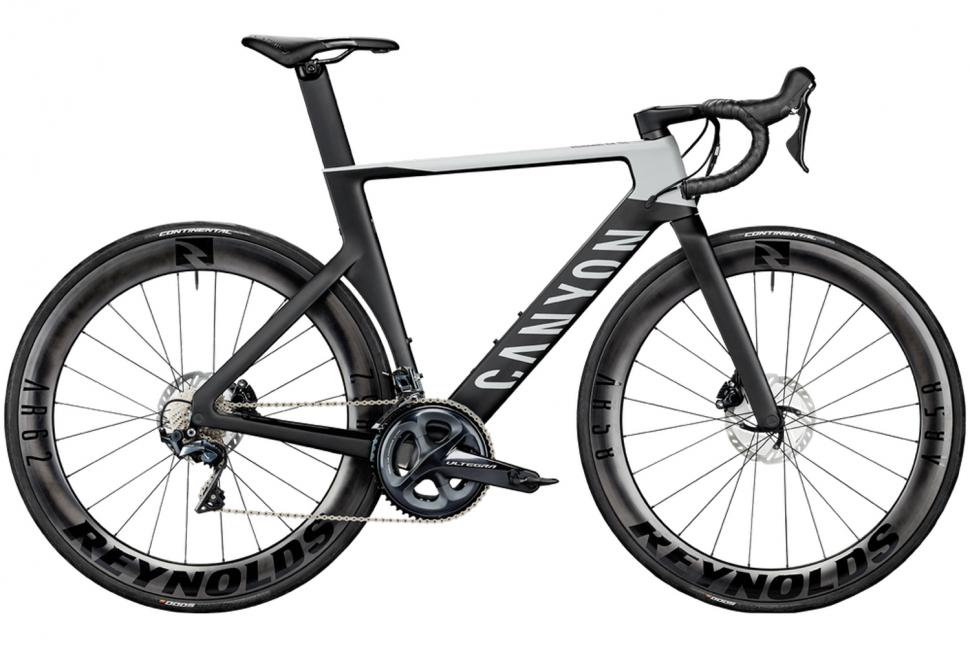- News
- Reviews
- Bikes
- Accessories
- Accessories - misc
- Computer mounts
- Bags
- Bar ends
- Bike bags & cases
- Bottle cages
- Bottles
- Cameras
- Car racks
- Child seats
- Computers
- Glasses
- GPS units
- Helmets
- Lights - front
- Lights - rear
- Lights - sets
- Locks
- Mirrors
- Mudguards
- Racks
- Pumps & CO2 inflators
- Puncture kits
- Reflectives
- Smart watches
- Stands and racks
- Trailers
- Clothing
- Components
- Bar tape & grips
- Bottom brackets
- Brake & gear cables
- Brake & STI levers
- Brake pads & spares
- Brakes
- Cassettes & freewheels
- Chains
- Chainsets & chainrings
- Derailleurs - front
- Derailleurs - rear
- Forks
- Gear levers & shifters
- Groupsets
- Handlebars & extensions
- Headsets
- Hubs
- Inner tubes
- Pedals
- Quick releases & skewers
- Saddles
- Seatposts
- Stems
- Wheels
- Tyres
- Health, fitness and nutrition
- Tools and workshop
- Miscellaneous
- Tubeless valves
- Buyers Guides
- Features
- Forum
- Recommends
- Podcast
TECH NEWS
 Brexit Flickr Creative Commons
Brexit Flickr Creative CommonsBrexit and the bike industry: how the situation is evolving
Since we looked at how the new Brexit rules were affecting UK brands, retailers and distributors two weeks ago, things are continuing to evolve. What does it look like the situation will be, in terms of supply and pricing, over the coming months?
If Britain leaving the EU wasn't enough to contend with, an ongoing shortage of shipping containers in Asia since the start of the COVID-19 pandemic has had a knock-on effect of price increases, making it even harder for brands to absorb the already escalating costs of Brexit with tariff fees and new customs costs.
Stock that brands have built up in anticipation of port delays (because of lengthier customs processing) are dwindling as a result of the continual high demand of bikes—which, on top of shipping container shortages, has meant delays for customers after purchasing.
We previously reported on how the UK’s new rules on VAT are impacting brands and retailers in the EU selling to customers in the UK—with some having suspended sales to consumers temporarily, and others stopping altogether. Pages with Brexit rules and FAQs are popping up on websites as they try to effectively communicate to customers their approach in following the new guidelines.
There has been some confusion regarding who pays what charges — company or customer — and whether those charges are taken at checkout or upon delivery with courier.
> Planet X customers on the continent being asked to pay UK VAT amount as well as EU VAT
We reported yesterday that Ribble admits its information “could have been clearer” around the 14% post-Brexit tariff applied to bikes moving between the UK and EU that fall outside of the new 'sale of origin' rule, and has offered to refund the tariff amount for EU customers who ordered between 1st-17th January.
David Stacey, Ribble's Commercial Director, said: "We’ve removed all UK VAT from the pricing that any European customer will see, so they aren’t paying for that twice. The customer also gets a pop-up message when they’re in our Bike Builder, which is the process every customer has to go through to buy a bike from us.
"That pops up to tell the customer that because of Brexit and the changes, they will be liable for local taxes and they will need to work that out with their local customs office when they receive the bike.”
Italian clothing brand La Passione also states on its website that for orders over £135, UK VAT will need to be paid to the courier upon delivery, and warns that the courier could charge an additional management fee.
Canyon has simply changed its pricing to cover any applicable duties or customs handling fees, so you see the whole amount you will have to pay at checkout: “The benefit is the pricing you see on our website and during checkout is the final pricing, and there are no additional fees once your Canyon order arrives with you,” the German bike manufacturer added.
Prices are rising, but not in a uniform fashion, as brands attempt to absorb some of the additional costs. As we reported, taking the Canyon Aeroad CF SL 8 Disc as an example, the price increase of 9.21% is not as much as the 14% import duty; but still, it's a significant increase for customers.
One EU bike brand, that wishes to remain anonymous, has made road.cc aware that new customs costs are based on the volume of the parcel being shipped rather than weight. Although bike boxes are quite light for their size, calculating the shipping in this way means that considerable fees are being levied. This is a particular issue for lower end bikes, as the increased fees are proportionately greater relative to the cost of the bike compared to higher end models.
Mitigating that 14% import tariff (if a sizeable proportion of a bike's frame and components are made outside of the UK and EU), plus the new customs charges is difficult for many brands to fully cover themselves.
Added to this, freight rates have risen to new highs due to the shortage of shipping containers transporting goods from Asia into Europe. The cost of shipping a 40ft container from Asia to Northern Europe has increased from $2,000 in November to more than $9,000, according to the Financial Times.
The slowdown in global trade and economic shutdown in Europe in the spring of 2020, due to coronavirus lockdowns, meant less containers were shipped back to Asia. Then in the second half of 2020, western demand for Asian-made products soared, and so did freight rates as shippers became desperate for available containers. Port delays are causing a further rise in prices, as freight operators are charging extra to compensate for longer waiting times.
For Ribble’s UK customers, this issue surrounding the shipping container shortage has meant lengthy lead times after purchasing.
David Stacey commented: “These factors are definitely not new, since about October time we’ve been experiencing major delays at ports.
“Not all of that is to do with Brexit, it’s to do with several other factors, mostly COVID and the furloughing of people at ports, and this has created a massive knock-on effect of container shortages and shipping delays, and therefore supply and demand dictates the price rise [with containers]."
This is an issue the brand has been battling for months now, but Brexit complications has exacerbated these inter-weaving problems. Stacey added: “It’s really difficult as a UK manufacturer, because we’re totally reliant on those constituent parts arriving with us. We basically build to order, none of our bikes sit on a shelf in a box. Every single customer who orders a bike from us has it hand-assembled from its constituent parts, and we’re just being crippled really by these delays. It’s been very, very difficult.”
> road.cc Sportive & Endurance Bike of the Year 2020/21
This all coincides with an increase in the numbers of us cycling and buying bikes, as the UK government has supported and encouraged cycling (amongst limited other forms of exercise) to continue through the pandemic, and the related lockdowns.
> 12 ways that lockdown has changed cycling
Ribble’s CEO Andy Smallwood said: “We’re still tracking at a very high level of demand. We forecast on a very regular basis, but it takes time to react to an increase in demand, and that’s compounded by delays as well.
“We are well placed to meet the demand, although there is obviously lead times involved, and that has an impact on what product will be available.
“That’s not just us, that’s the whole bike industry. Lead times are growing and availability is tough.”
> Bike at Bedtime: Drops Le Col Ribble Endurance SL R Disc
Any well-made plans made before the new Brexit rules arrived on 1st January 2021 have only helped to a limited extent.
Smallwood added: “We bolstered stock around multiple Brexit timing points in order to cover us for any delays. But with the bike industry there’s been significant growth, so that’s eaten into any buffer stocks we put in around Brexit. From a stock perspective and delays it wasn’t a case of being unprepared, just a case of other factors outside of that which has impacted us.”
Are the buffer stocks from other brands on the verge of completely running out? Perhaps then, we will see an even bigger hit from customs delays and shipping container shortages, as there’s no back-up stock to hide the damage?
There is also another issue emerging, relating to transporting imports from the EU, that could have implications on the bike industry in the coming months.
Increasing numbers of freight groups are rejecting contracts to move goods from the EU to Britain, according to a recent report by The Guardian. This is explained to be the result of the burdensome new financial guarantees, known as T1s, that apply to goods being exported to the UK. Alongside this, customs declaration and Rex (registered exporter system) documents to certify the origin of the product need to be provided, and cause added complications and paperwork for these freight companies—and these shippers are simply not interested.
We'll be following the developments over the coming weeks and months, and will provide updates when any significant changes happen with the current situation. Are you a bike brand, distributor or customer with a story to tell about Brexit and the bike industry? Get in touch at info [at] road.cc
Anna has been hooked on bikes ever since her youthful beginnings at Hillingdon Cycle Circuit. As an avid road and track racer, she reached the heady heights of a ProCyclingStats profile before leaving for university. Having now completed an MA in Multimedia Journalism, she’s hoping to add some (more successful) results. Although her greatest wish is for the broader acceptance of wearing funky cycling socks over the top of leg warmers.
Latest Comments
- KDee 5 min 14 sec ago
Probably a friend of Herbie, or Christine.
- HarrogateSpa 10 min 41 sec ago
Although she was deputy Mayor of London for Transport, she is now MP for Swindon South.
- David9694 1 hour 25 min ago
Tensions escalate over violations in Devon no-car zone...
- David9694 1 hour 31 min ago
Car ploughs into Fair Oak home and crushes couple's cars https://www.dailyecho.co.uk/news/24762662.car-ploughs-fair-oak-home-crus...
- Another_MAMIL 1 hour 32 min ago
Who spends £55 on a bucket hat?
- HoarseMann 14 hours 18 min ago
Not quite the same scenario, but has some similarities......
- HoarseMann 14 hours 36 min ago
“It all happened so fast,” the bus driver said in his statement. “To my horror I saw a male laid on his back with a mobile phone on his chest and...
- wtjs 15 hours 22 min ago
no one cares enough to fix it...
- wtjs 15 hours 31 min ago
I won't be getting anything on Friday...
- IanGlasgow 18 hours 35 min ago
CHPT3 is in receivership. Their website replaced by this notice. https://chpt3.com/





Add new comment
153 comments
How much do you think trade with the EU will decrease?
Clearly it won't cease altogether.
We only have to increase trade with the rest of the world slightly to offset the small decrease in trade with the EU.
Given the projected growth of the EU relative to the rest of the world any increase in trade outside the EU would likely be compounded by a rapid increase in the relative size of the non EU market.
There's the rub - on trade, at least. EU trade won't stop, but the barriers that we have seen are a problem. We can't start exporting fresh scallops to Singapore as they'll be off before they arrive. We are unlikely to export financial services to developing countries as the demand there for business capital is mostly met locally or by China, and the demand for savings and pensions is lower.
Do we sell enough of the things that non EU countries want to buy and can be delivered? You may have more data than me, and hence an answer, but it still seems as if we made things far harder with one of the two biggest global markets in the hope of replacing that business mostly from smaller and less appropriate (further away, different requirements to our domestic market) ones.
I respect your point of view rich_cb, but I really struggle to balance this downside with any upside.
I think you only have to look at trade volumes between the UK and China to see that huge volumes of trade are possible even over longer distances.
As countries develop economically financial services and access to capital are some of the things they require most.
The UK is a world leader in this regard so mutually beneficial deals with rapidly developing countries should be eminently possible.
I view Brexit as a long term benefit to the UK. In 20 years the world economy will look vastly different to how it does now, the EU will represent a far smaller portion. At that point trade with rest of the world will be far far more important to our economy.
By prioritising that trade now we can ensure that we gain most from the changes that are already happening.
I get where you are coming from and hope you are right - genuinely, I would far rather be wrong on this. But I do think that the damage is not worth it. The UK will be marginalized further by the time the development has happened. Chinese capital will dominate, it's more a question of how it is accessed, and once that role has left the UK it will not be back. The same is true of other parts of the outsized financial services industry.
The other issue, relevant to the original article, us that we don't just buy and sell country to country. Global supply chains go through many stages, some of it mad, with huge transport distances between processes in manufacturing. But some of it is sane, with finished articles being composed of parts and labour from all over the place. We have wrapped all this in red tape in a protest against red tape.
The development is likely to be rapid in economic terms.
Over the next decade many large developing countries will move firmly into the middle income category.
This will change the dynamic of the world economy immensely.
Outside of the EU we will be able to react more quickly and adjust trade policy more efficiently to capitalise on these changes and maximise the opportunities available.
Rules of Origin may provide problems for companies like Canyon/Cotic who essentially import products from outside the EU then bolt them together and brand them but for most companies that are actually involved in real manufacturing in the EU the effect will be negligible, see Mason cycles for example. No tariffs on any of their products.
The Rules of Origin are absolutely essential to future British trade deals as they are the only reason we are able to deviate from EU trade policy and yet still maintain a free trade agreement with the EU.
China will undoubtedly try to dominate the world financial system in the coming years, that's part of the reason why the CPTPP is so important, if the US can be persuaded to join then it will be a vital counterweight to Chinese influence in the region. If Taiwan joined (they have expressed interest) then joining would probably hugely reduce the cost of bikes in the UK. A minor point in economic terms but quite important to readers of this site I imagine!
I think damaging EU trade in the hope that trade with the rest of the world will compensate and leave the UK better off is a massive leap of faith that I was unwilling to make at the Referendum and struggle with now.
As this is a bike business story, it is clear that the bike consumer is worse off today since leaving the single market and custom union.
I genuinely hope you are right, and I am wrong, and over time the trade advantages you talk of do turn up and they outweigh today’s disadvantages. I suspect that Rees-Mogg may be right (not a phrase I thought I would ever type) and that we may have to wait 50 years for any benefits to show.
I agree that it is a leap of faith but you could argue that remaining in the EU and hoping that its various problems would be resolved satisfactorily would also have been.
I do actually agree that, at this present moment, bike consumers in the UK are worse off.
It is however worth considering that for years bike consumers have paid a 14% tariff on most imported bike frames due to the EU common external tariff.
This is despite the fact that there is, afaik, no large scale frame production occurring within the EU at all.
It is essentially an extra tax that cyclists have been paying for decades.
If the UK follows a genuinely free trade path then I would hope to see those tariffs abolished to the great benefit of UK cyclists.
Really nice, but those import tariffs were intended to protect EU industry. And the UK will also want to protect certain industries, perhaps not frame production. However, you have a lot more negiotiation leverage with a total population of >500 million (EU single market) than with 66 million. And in addition, you need to make (and maintain!) your own norms and standards now to protect yourself against the import of potential dangerous garbarge at dumping prices. So, in all, there's probably a long road ahead. With more "power" comes a lot more responsibility and concerns.
Some tariffs are protectionist. There's an argument that even those are counterproductive. Outside of the EU we have a far narrower range of products to protect so we need fewer of those regardless of your opinion on their usefulness.
Other tariffs are merely taxes in disguise, bike frames being just one example.
As the 5th largest economy in the world you can literally count on one hand the number of countries that will have leverage over us in terms of economic clout and we already have trade deals with two of them.
As the 5th largest economy in the world you can literally count on one hand the number of countries that will have leverage over us in terms of economic clout
Oh dear! Is there no limit to the propensity of these people for self delusion? Germany took over from the UK as the economic powerhouse of Europe around 1870 and it's still there now. The next few years will demonstrate the extent to which it's a very foolish idea to pick a fight to the death with an economic group which is really up there at the top. That the fight is being 'led' by a buffoon and his sycophantic band of merry thickheads at a time of Covid economic catastrophe, against an EU with some highly competent leaders like von der Leyen and Merkel who also have some understanding of science, is our quadruple misfortune.
Are we not the 5th largest economy in the world?
Do we not have trade deals with 2 of the 4 economies above us?
You may find those particular pieces of information inconvenient but, alas, you can't choose your own facts.
Look everyone, we're still the 5th! Brexit's not that bad.
Okay, we were when we were in the EU. And we had massive and diplomatic and democratic influence which we've just thrown away, which has the knock on of lessening our world standing and influence. And the brexit goons have also thrown away all UK citizens European rights.
But look - we're at least a few days in, and we have yet to drop from 5th. Brexit's great!
And don't forget we can have blue passports now!
Is that 5th because of, or in spite of EU?
Rich knows a lot, we could ask him...
Why couldn't we increase our rest of world trade before, like Germany did? What was actually stopping us? After all, the EU had deals with most of the countries that we might want to trade with. Deals so good that we just rolled them over without changing much.
Is it preferable to trade on WTO terms or to trade within a Free Trade Agreement?
Of our top 5 export markets outside the EU sphere we only have FTAs with 2. It's clearly incorrect to say we have trade deals with most of those we "might want to trade with".
Germany and several other Norther European countries benefit from an undervalued currency so their export numbers can't be directly compared to the UK's.
Trade agreements negotiated with by the EU are not tailored to the UK's needs. The highly complex regulations regarding orange imports in the South Africa agreement being a prime example.
Outside of the EU we can negotiate based on our own specific priorities, this will allow us to reach deals with more countries and to increase trade accordingly.
Well, because our economy is predominantly services led - and there is no going back: it's the UK's competitive advantage, if you like. But services are more difficult to freely monetise cross-border than goods - and, they are also easier to provide from multiple jurisdictions.
So, for example, if Germany supplies a BMW to China there is no doubt that the BMW came from Germany, but the sale of services are more complicated and are very likely to be provided by a UK firm in country rather than cross-border...so it doesn't count towards UK GDP. The cost of manufacturing a single BMW in China is the cost of an entire plant. The cost of providing accounting services is the cost of an accountant.
The EU single market was governed by the Single European Act (1986, I think, which provided for the free movement of capital, goods, services, and labour). It was supplemented by the treaties of Maastrict and Libon which crucially changes labour for people...meaning you could move freely without work - though only the UK accepted this unamended).
Where we are 40 years on is that the EU has perfected the single market for services, but crucially (for the UK, at least) did not perfect the single market for services - leaving our economy at a disadvantage.
I got CSE woodwork not recommended at school and am not very good at making things. If I tried to feed my familiy on my manufacturing ability then they would a) be poorer, and b) starve.
Going cycling now. It's sunny and not snowing!
Give it up. You're not convincing anyone, not even yourself. "New" trade agreements are simply replicating some of those we already had by virtue of being EU members.
...we are now free to pursue new trading opportunities"
Such as what for example?
And what stopped us before June 2016 in doing the same?
Oh you know... things....
We were not allowed to strike our own trade deals whilst in the EU.
We were also required to abide by the Common External Tariff.
The CPTPP is one example of a new trading bloc we are looking to join.
Yes we were. We were part of any new deal that we were able to engineer as part of the EU. We had a great deal more bargaining power than as an individual country.
That's true, but rich is also right that the UK could only join in with EU deals and these were slow (remember the veto of the Walloon assembly on the Canada deal after about 12 years?).
But the bargaining power is surely a bigger factor. The UK may well be 5th in the table but the table is tight, with India and France close behind. And it's actually the wrong measure - this needs to be done by the size of trading bloc. When the UK was in the EU, it was in the top 3 blocs that actually have trade deals to negotiate. Now we are still in the top 10 I believe, but a bit part player.
And indeed the EU could only join in deals with our say so. It's teamwork and cooperation, and UK had a massive reputation (deservedly so ) as a deal broker within the EU - It got things done. Now of course we have minimal influence with the huge trading bloc on our doorstep.
Interesting that given that the johnson wants his legacy to be the environment, especially given the mismanagement of covid and the brexit balls up, that he would stick two fingers up at our closest trading partners in favour of a trade deal on the other side of the globe. It's almost as if he hasn't got s clue.
It might look like that to the naive it's true, but.......OMG, look over there, sunlit uplands!
CPTPP - Australia, Brunei, Canada, Chile, Japan, Malaysia, Mexico, New Zealand, Peru, Singapore, and Vietnam.
11 nations to trade with, all conveniently on our doorstep....
So were all UK's partners in teh EU. All had to abide by mutually agreed rules.
That's standard for any bloc where there is a customs union. As with everything there are drawbacks and advantages. In our case with EU, the advantages of the CET outweighed the drawbacks....
The whole clusterfck is completely self-inflicted and will take forever to roll back. Years of hassle lie ahead. Thanks for that, ignorant xenophobic brexiters.
Exactly. These bexiteers should be rubbing our nose in how good things are now shouldn't they? But where are they? Hiding away in a corner somewhere feeling a bit stupid maybe. I'm surprised no one told them all this was going to happen (yes, sarcasm).
Pages